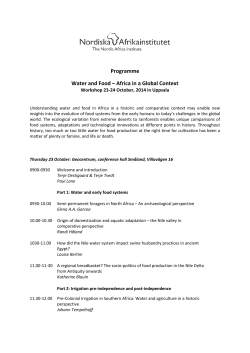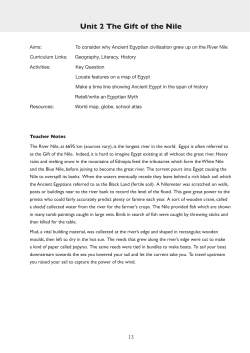
EARLY SETTLEMENT OF EGYPT, KUSH, AND CANAAN Mr. Korinek 7 grade social studies
EARLY SETTLEMENT OF EGYPT, KUSH, AND CANAAN Mr. Korinek 7th grade social studies Environmental Factors of Early Human Settlement: WATER The most important environmental factor in early human settlement is water like rivers, lakes, and inland seas are good sources of fresh water. People need to drink fresh water to live. They also bathe and wash things in fresh water which can help prevent disease. Water is also a source of food. People can catch fish that live in rivers, lakes and seas. They can hunt water birds and other animals that gather near water. And farmers need water to grow their crops. Water can also be used for transportation. Cities and towns would often use rivers as highways. Environmental Factors of Early Human Settlement: Topography Topography refers to the shape of the land. It includes features like mountains, hills, plains and deserts. Topography was important for early human settlement. Farmers usually settled in flat, open areas such as plains and valleys. Large, flat spaces gave them room to grow crop. Also, the rich soil in coastal plains and river valleys was excellent for growing crops. Mountains and deserts were less friendly to human settlement. Steep mountains were hard to cross. Their jagged peaks and rocky land made farming difficult. Deserts were hot and dry. They contained very little water for farming. The intense heat and lack of water made travel difficult. Environmental Factors of Early Human Settlement: Vegetation There are many kinds of vegetation, such as trees, bushes, flowers, grass, and reeds. The crops people grow are also a type of vegetation. Many physical features affect vegetation. Mild weather, regular rain, and fresh water are good for plant life. The areas around rivers and lakes are usually green and lush. Mountains are often covered with thick groves of trees. Deserts, being dry and hot have very little vegetation. The vegetation in an area influenced early human settlement in several ways. Most important, plants were a source of food. People ate both wild plants and crops they had planted. But vegetation had other uses as well. People learned to make many useful products out of plants, including medicine, baskets, rope, tools, and even paper. And plants and flowers helped to make a place beautiful Egypt and Kush Egyptians and Kushites both settled near the Nile River. Egyptians lived along the northern part of the river. The Kushites lived along the southern part of the river. Physical Features of Egypt and Kush The most important physical feature in ancient Egypt and Kush was the Nile River. Flowing north from deep within Africa, the Nile created a long, fertile valley that ended in a marshy delta near the Mediterranean Sea. The Nile River was surrounded by deserts on all sides that were extremely hot and dry. These deserts were harsh but provided a natural barrier that helped protect people living in the Nile River Valley. In the north, Egypt was bordered by the Mediterranean Sea. Settlers could not drink the water but it was rich in fish and other forms of sea life. Human Settlement in Egypt and Kush The Nile River valley, provided natural irrigation and fertilization. Every summer, the river overflowed its banks. The floodwaters soaked the dry ground. After several weeks, the water went down. A thin ribbon of silt (rich soil) was left behind. The soil was perfect for farming. There was fresh water with fish to catch, and animals to hunt. (fish, ducks, geese, hippos, crocodiles, giraffes, and ostriches. Human Settlement in Egypt and Kush The topography of the river also encouraged human settlement. The Nile had wide flat areas that were good for farming, that were watered by the Niles annual flooding. Vegetation was rare in the dry deserts, but it was plentiful in the Nile River valley. Useful plants included reeds and a tough water plant called papyrus. People wove reeds into baskets and roofs for their huts. They used papyrus to make rope and paper. The rich farmland made it easy to grow crops like what and barley. Environmental Factors and the Early Settlement of Canaan Canaan, where the ancient Hebrews settled, was a diverse land. Canaan’s physical features and environmental factors made settlement easier in some areas than others Physical Features of Canaan Canaan’s physical features included plains and valleys, hills and mountains, deserts, and bodies of water. In the west, coastal plains bordered the Mediterranean Sea. To the North, the Lebanon mountains rose steeply from the coast. The southern part of the range gave way to the lower hills of Galilee. The Jordan River flowed down from a mountain range through the middle of Canaan, heading south through the Sea of Galilee to the Dead Sea. The Land arround the narrow river valley included hills, grassy slopes, and mountains. The east was the hot and dry Syrian Desert. And on the west side was the Negev Desert. Environmental Factors and Human Settlement in Canaan In Canaan water was a key environmental factor. The wet, fertile plains near the Mediterranean Sea were farmed in very ancient times. Other bodies of water played a role in Canaans settlement. They Sea of Galilee was actually a freshwater lake. It had plentiful fish, and fertile land was nearby. The most important source of fresh water was the Jordan River. People hunted, fished, and farmed along its banks. But unlike the Nile, the Jordan did not flood regularly, so its valley was not as fertile as the Nile’s. Environment Factors and Human Settlement in Canaan Farmers found it easiest to live in the coastal plains and near the Jordan River. But many areas, had dry soil and it made farming difficult. As a result many ancient Hebrews became herders rather than farmers. Herders tended flocks of sheep, goats, cattle, donkeys, and camels. They were nomads wandering from place to place to find land for their animals to graze.
© Copyright 2025

















